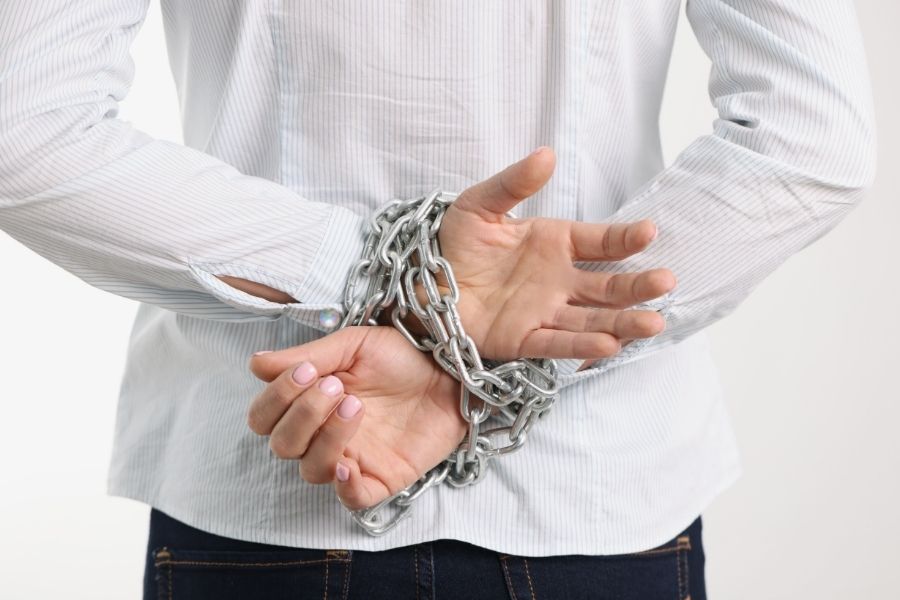Written by Valentina Dragomir, Psychotherapist |

Self-esteem has always been a widely discussed topic in therapy and beyond. It is one of the basic elements that changes in therapy with work and perseverance. But sometimes the course of therapy makes it improve naturally, as a consequence of this process.
In this article we talk about low self-esteem and something I call “the chains” of low self-esteem. These chains are negative core beliefs, self-criticism, behaviors and attitudes that can hold you in place, and will hinder your joy.
What is self-esteem?
Self-esteem is the way we value ourselves as human beings. The opinion you have about yourself, the way you perceive yourself, the beliefs you hold about yourself, the inner voice that tells you things about what you can and cannot do will determine your self-esteem and obviously, your self-confidence.
I invite you to read a more detailed article on the definition of self-esteem.
How is self-esteem formed?
Self-esteem is formed in childhood, by learning about yourself and while your personality and self image develop. Self-esteem is formed and changed as a result of your experiences, the opinions of others about you. These opinions are internalized because as children we do not have a reference system to tell what is true or not about ourselves. Another thing that influences the development of self-esteem are the materials we watch on TV or the magazines we read, the failures and successes we experience at all ages.
Many of us blame our parents for our low self-esteem, but let’s look at things from a different perspective for a second. They are not the only people we have interacted with during our growth and development as individuals and they are not the only factor that influenced our self-esteem.
However, there is an important contribution from our parents to who we are today, but our parents are just as important as other people that might have had an impact on our self esteem. Trust me, instead of blaming someone for our self-esteem, it is more important is what we do from now on to continuously develop and improve ourselves.
When we are small, we easily build an image of who we are and what our place in the world is by what other people tell us about ourselves, what our abilities are, what we are good at, what we are not good at. Therefore our self-esteem can vary from low to high self-esteem and vice-versa.
Can self-esteem change?
Once formed, self-esteem does not remain nailed down. It can fluctuate throughout life depending on the events we go through, the people we spend time with, the successes / failures we have and what we learn from them.
If you think that you have low self-esteem, don’t worry.
Below are some personal development tools that you can use to restore your self-esteem. I rely on the fact that there are resources in you that can’t wait to be brought to light and used, and on the inner strength that you have to be able to feel better. However, increasing self-esteem can be a long process with ups and downs, but beneficial.
What are the chains of low self-esteem?
Below is a list of common statements for people who have low self-esteem. I call them “chains” because they can hold you down, they can stop you to achieve your dreams or goals. You can read and identify the ones that suit you:
I’m not confident I can finish or start a new activity / project
I find it too difficult, I give up easily even at the first obstacle encountered. I think I can’t, that I don’t have the skills, that I’m not smart enough, fast enough, skilled enough…
I don’t like myself
I don’t feel good in my skin. Many times I wanted to change something about myself or my body because if I looked different my life would be different. I would have more confidence, I would speak more in public, more men / women would swarm around me, etc.
I focus more on the negatives
I see the obstacles more clearly than opportunities. I see the difficult part of a thing easier than I see the solutions or how I could solve a problem. So I don’t even give myself the chance and I don’t take the opportunities that get in my way.
I often blame myself
For example, you tell yourself that it’s your fault because someone didn’t talk to you as much as usual today. Maybe you said something they didn’t like. But later you find out that they were busy thinking about how to fix a problem or something like that.
I apologize frequently
I apologize for everything, for things that happen, but aren’t my fault. I consider it to be my fault for many things that happen.
I want to make a good impression on those around me
I behave in different ways that are not natural to me. I do this because I want others to see what a valuable person I am and to make them like me. The goal is a good one – building relationships and maintaining them. But the means by which you do this is not healthy and in time will make you sad and lose confidence in yourself.
I’m afraid of being ridiculed
I’m afraid that others will laugh at me for who I am or because I said or did something wrong. This makes me think about what others think of me and it makes me feel anxious.
It’s hard for me to decide. I seldom make decisions on my own
I depend on my mother / father / couple partner / anyone else to make decisions for me. I basically don’t have the initiative because I don’t know if what I want is right or good, or if it will upset someone. They tell me what to do, how to do it, and I listen to them because I can rely on their decisions. I trust that their decisions are better than mine.
If these people didn’t decide for you anymore, it be hard for you to know what’s the good or correct decision. They are your reference system.
I can’t say NO
When others ask for more and more from me, I can’t disappoint them and say NO. That sometimes – if not all the time, it annoys me and makes me feel like a doormat. I feel that others are disrespecting my limits, my time, my needs. I feel that they really do not care about me. I want to tell them how I feel, but I’m afraid I’ll hurt them and they won’t like me anymore. And eventually they will leave me.
Now with the identified chains let’s go further and see how they influence our relationships.
What is self-esteem good for?
Self-esteem is a good predictor of success in life. But not all successful people have high self-esteem. This is not always true. Good self-esteem can ensure an inner calm, orientation towards solutions, proactivity, taking risks and responsibilities, effective communication, healthy relationships, confidence in yourself and your skills.
What is the role of self-esteem in relationships?
Self-esteem can influence the course of a relationship. It is proven that people who have low self-esteem are more likely to stay in unhappy relationships.
If self-esteem is high
You will respect yourself and take into account your needs in relationships. You will communicate and possibly negotiate your needs to reach a balance. You will not feel the need to ask for proof of the other’s love. You will not feel the need to check if your partner is loyal to you. You will not be afraid that anyone of the same sex as you is a potential danger / enemy to your relationship.
You will know how to give others the space they need. You will ask for what you need. You will demand respect and you will give respect in turn, because you know your value and you see others as valuable too.
If self-esteem is low
You will do a lot to please others, not to upset them or quarrel with them. You think that expressing your opinion will create a conflict that you avoid by keeping to yourself what you want to say. You will not know what your needs are and you will prioritize those of others, because you just want to be a good person, you don’t want to hurt other people. But what you don’t know is that your needs do not hurt other people.
You will ask for proof of love from the other, overwhelming your partner. You will not know your worth, your potential, you will not know how to ask for respect from others. You will be afraid to get out of a bad relationship because you do not know who you are and what or how you will be without that person.
Besides, you think you’re lucky to find someone who likes or accepts you, even if things aren’t nice at all between you. Even if the relationship is an abusive one, you still have difficulty getting out of it. Who else would find you attractive? and worthy if not the abuser you’re in a relationship with, right? Here self-esteem is very low.
Self-esteem and self-respect
Sometimes we get into relationships with people who have a negative impact on our lives. There are many relationships in which abuse is common. These are called toxic relationships and have the ability to destroy our self-esteem, confidence and self-worth. In such relationships with people we become dependent on the partner because we no longer know who we are if we are not in a relationship with them.
Self-esteem and relationships with abusive people
In relationships with people with abusive behavior (verbal, physical, sexual, emotional, financial) in which we are the victim, the best remedy is to end the relationship.
Sometimes breaking up with the abuser can be life-saving. If you find yourself in this situation, get out of the relationship as soon as you can, seek support. You are a valuable person and worthy of the love and respect of others.
Happy case
If you find yourself in the happy case, that is, if you are in a relationship with people or in a couple or with anyone else who has helped you grow as a person, grow and become confident in your own strengths, you are I could say, blessed. Even if life is the way it is, you can handle any situation. You know who to go to when you need help. You are open and flexible to change because you know you have all the inner resources to deal with any situation. You often say “I can do this” or at least “I can try.”
How to improve your self-esteem?
There are great ways to help you improve your self-esteem. Some are simpler, some not at all. Of the ones listed below, some are light and some are not. It is not easy, rebuilding self-esteem takes time and a lot of work, and specialized help may be needed. But don’t be discouraged. Here’s what you can do before you go to a psychologist or therapist:
Go back to yourself
How would you describe yourself now and what would you like to change? Make a list of all the beliefs you have about yourself. You will see what you know about yourself and what can be improved.
Accept yourself as you are
If you accept that you have both goods and bads, you will no longer be afraid of how others see you.
Communicate your needs assertively
Be clear and direct and show respect to others. Assertive communication works wonders when it comes to asking what you need, setting personal boundaries or simply saying NO when you want. Give up pleasing others and you will see that you suddenly seem to have more time for yourself, worry less or even feel more relaxed.
Allow yourself to be wrong and make mistakes
Making mistakes is part of the normal learning process. Turn any mistake or failure into a valuable lesson and this way you grow.
Experience new things
Discover the aspects you like or dislike and see how they are useful in your life. This way you can make the things you like less have a good use for you.
Accept both criticism and compliments
Give thanks for both. Criticism is a resource for you to develop personally. What about the compliments? And the compliments as well. Especially when you compliment the other person as soon as they compliment you. You can start by answering only “thank you”.
Take care of your body
Your body should not be neglected when you are in a process of strengthening your self-esteem. Take care of your body. Eat healthy, get enough sleep, exercise regularly. Getting enough sleep allows your body and brain to restore, giving you a boost in emotional wellness.
Adopt a straight body posture
The upright posture of the body means that you can support yourself. Try to keep it as long as possible. You can prepare your body for self-confidence with a good posture, and over time you will become more confident.
You are the most important person in your life
To believe this is not selfishness. But it is self-love.
Don’t forget to take small steps and be realistic
Be patient, persevere.
Resources:



